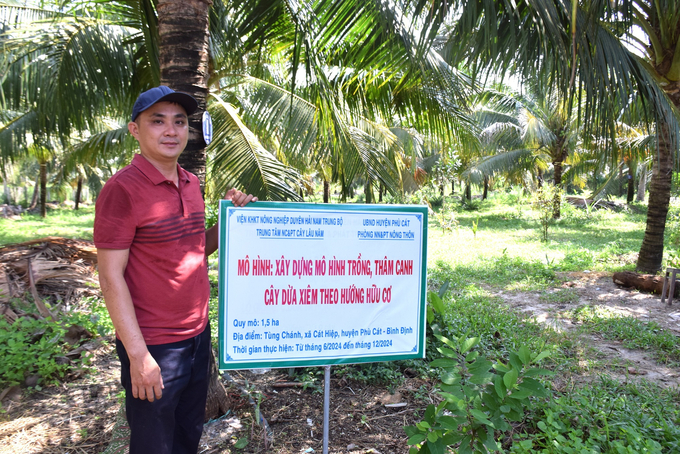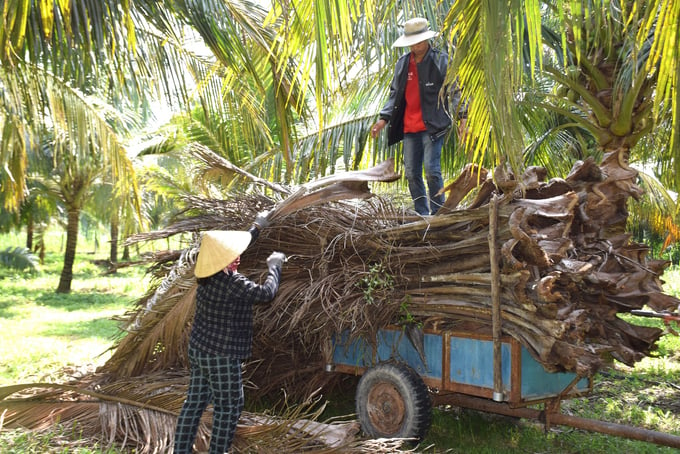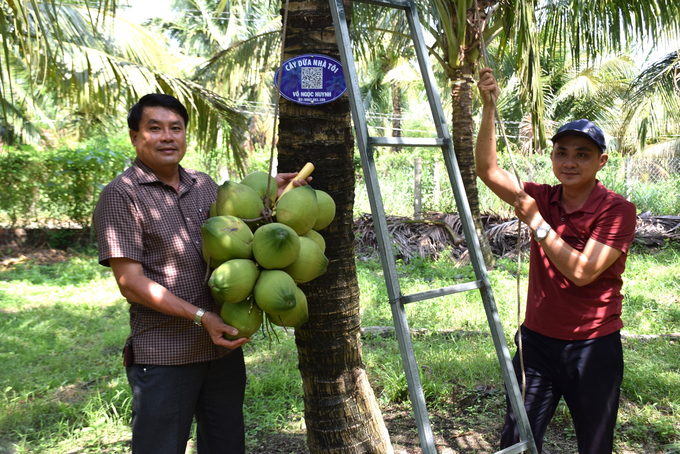November 27, 2025 | 19:15 GMT +7
November 27, 2025 | 19:15 GMT +7
Hotline: 0913.378.918
November 27, 2025 | 19:15 GMT +7
Hotline: 0913.378.918
Accompanied by Vo Dinh Tri, an agricultural specialist from the Phu Cat District’s Department of Agriculture and Rural Development, we visited a 1.5-hectare organic coconut farm belonging to Luu Anh Vu, a 33-year-old farmer in Tung Chanh Hamlet, Cat Hiep Commune, Phu Cat District. The canopies of multiple eight-year-old coconut trees, laden with heavy clusters of fruit, resembled giant umbrellas shielding us from the harsh sunlight overhead.

Luu Anh Vu's organic coconut farm. Photo: V.D.T.
According to Luu Anh Vu, he tended to his coconut farm using traditional methods during the early years, with a notable absence of the current organic practices. He acquired these techniques from training sessions organized by the Phu Cat District’s Department of Agriculture and Rural Development.
The coconut farm owner also shared that local farmers were initially skeptical towards the practice of organic coconut farming. However, in reality, organic farming is relatively undemanding and yields significant profits.
"I make use of coconut by-products such as coconut coir, dry coconut husks, and dry coconut leaves, composting them with manure to fertilize the trees. Each year, I apply organic fertilizer twice, once at the beginning of the rainy season and once after the rains. For each application, I use 8 to 10 kilograms of fertilizer per tree. I also spray biological pesticides twice a month—once at the beginning and once in the middle—to control pests. Additionally, I create basins around the base of each tree three times a year, which helps retain both fertilizer and water. I also mound the soil from the basins around the tree bases. I water each coconut tree daily, with only enough water to maintain soil moisture," Vu explained.
He noted that the yield of each tree increased from 80 to over 100 coconuts per year. The mature coconuts feature a distinctly sweet water, making them a highly popular product among consumers.

Binh Dinh farmers compost coconut by-products with cow manure to create organic fertilizer. Photo: V.D.T.
Local residents of Binh Dinh Province often visit Luu Anh Vu’s farm to purchase coconut trees for a duration of one year at the price of 800,000 VND per tree. On average, each tree produces nearly 100 coconuts per year, with each coconut fetching a price of 8,000 VND. Residents who need coconuts for household consumption purchase fewer trees, whereas retailers buy in bulk quantities to ensure a steady harvest. "After selling the coconuts, I only need to tend to the trees without worrying about finding buyers. Throughout the year, when the coconuts are ready for harvest, I simply call the buyers to collect. With fresh coconuts approved for officially export to China, I believe the price for drinking coconuts will no longer fluctuate depending on the season as it did in the past," Vu shared.
According to agricultural specialist Vo Dinh Tri, a substantial portion of Phu Cat District’s 1,200 hectares of drinking Siamese coconut production area currently employs organic farming practices in compliance with the guidelines issued by the Binh Dinh Province's Department of Agriculture and Rural Development.
Vo Dinh Tri emphasized that drinking coconuts from Phu Cat District, and Binh Dinh Province as a whole, meet the import requirements of China, as they are primarily cultivated through organic methods, thereby ensuring food safety.

Vo Ngoc Huynh agreed to buy a coconut tree from Luu Anh Vu for a duration of one year. Photo: V.D.T.
"By utilizing coconut by-products and manure to create organic fertilizer for the coconut trees, local farmers can reduce investment costs considerably. My coconut farm of 100 trees generates a minimum annual income of 80 million VND, while expenses for electricity, irrigation, and biological plant protection products are only around 20 million VND. As a result, I can confidently earn a profit of 60 million VND per year from 100 coconut trees," shared Luu Anh Vu.
"The coastal sandy areas of the South Central region possess the potential to expand its specialized drinking coconut production area to between 300,000 and 400,000 hectares," assessed Dr. Ho Huy Cuong, General Director of the Agricultural Science Institute for Southern Coastal Central of Vietnam.
On August 19, the Ministry of Agriculture and Rural Development and China's General Administration of Customs (GACC) signed a protocol on the export of fresh coconuts to the Chinese market. According to Deputy Minister Hoang Trung, this collaboration presents a significant opportunity to restructure production, enhance cooperation, and expand market access.
"China consumes more than 4 billion coconuts annually, including 2.6 billion for direct consumption and 1.5 billion for processing. However, their domestic production capacity is insufficient, presenting a major opportunity for Vietnam," he added.
Translated by Nguyen Hai Long

(VAN) China’s cooking oil is suddenly flooding into India. It all comes down to a soybean surplus that Beijing doesn’t quite know what to do with.

(VAN) An Giang promotes supply-demand connections, standardizes quality and builds value chains, creating a foundation for sustainable bird’s nest development and aiming to expand exports.
/2025/11/24/5339-4-nongnghiep-075331.jpg)
(VAN) Recently, the conference on 'Sustainable Fisheries Linkage Chain - Tilapia for Export' took place in Tien Hai commune, Hung Yen province.
/2025/11/21/4309-2-153400_128.jpg)
(VAN) Green and low-emission rice is paving the way for Vietnamese rice to enter high-end markets, marking the beginning of a transformation journey toward greening and elevating the national rice brand.

(VAN) ‘Right to Win’ outlines a national action plan that shapes a new vision for Viet Nam’s agriculture in an era of renewal and global integration.

(VAN) Lam Dong’s farmed sturgeon output this year is expected to reach 2,300 tons, worth VND 450 billion, affirming the brand’s position on the market.

(VAN) A surge in Ukrainian egg exports, largely driven by soaring sales to the UK over the last few years, has notably pushed up egg prices on the domestic market.